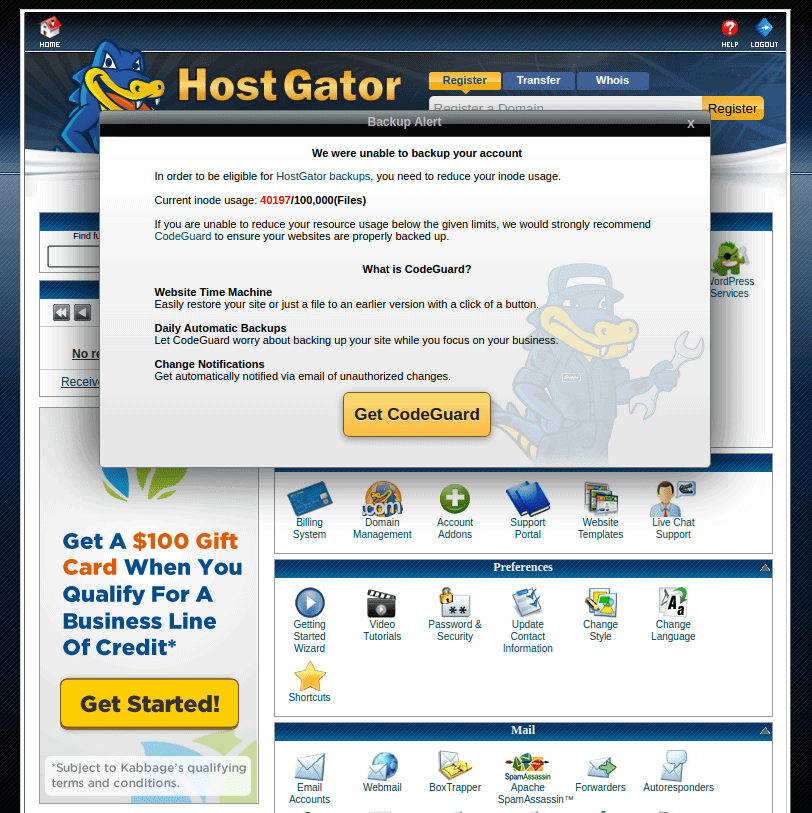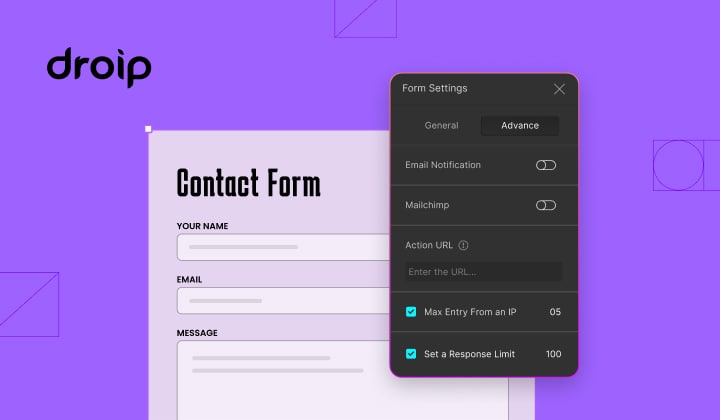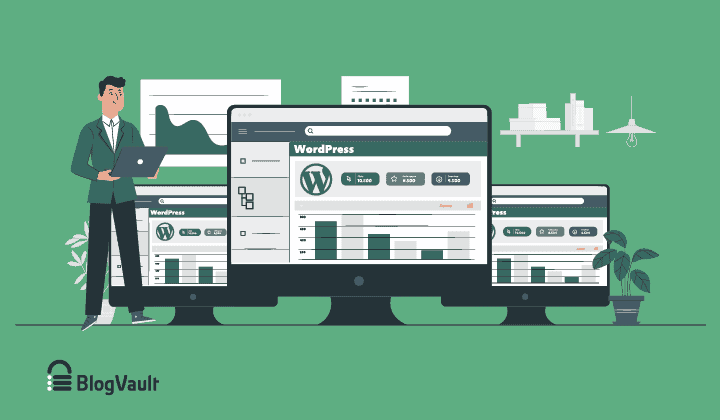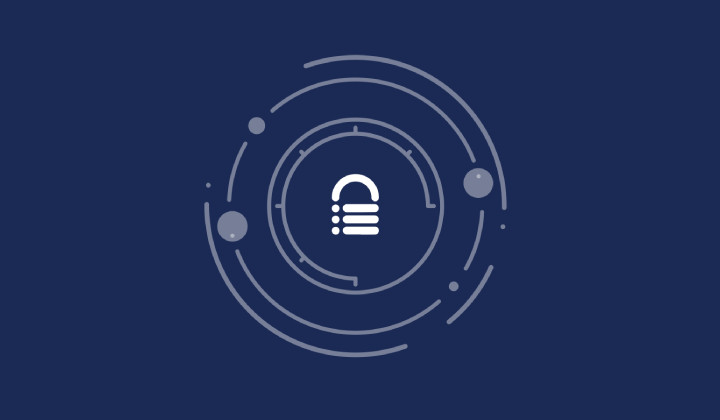A Review of HostGator WordPress Backup: Are they any good?
Bulletproof Backups for Your WordPress Website
Fortify your business continuity with foolproof WordPress backups. No data loss, no downtime — just secure, seamless operation.
Many people rely on web hosts for their WordPress backup. Is this a good practice, and are HostGator backups any good?
We believe secure backups which are completely independent of your web host is a must for all who host websites. Otherwise, you may find that your backups are lost along with your website. In this case of WordPress users having a strong backup solution is important.
Backups are usually judged by how easy they are to restore, and how little burden they put on your labour or resources to make, store, and secure them. How do HostGator backups measure up on these points?

HostGator Backups: What do you get?
Frequency: Only once a week
HostGator creates backups of your site once every week. However, this is done on a random day of the week. There is no fixed day or time when your site(s) are backed up each week.
Ideally, we believe that automatic backups must be done daily. If it is automated then even better.
Storage: Only one copy of backup
Only one copy of backup is stored by HostGator. Each new round of backups overwrites the previous one. If you have a problem with your site, then chances are that the latest backup will also have the same problems. Restoring from that version may not be the best solution.
Ideally, multiple copies of backups need to stored. WordPress.org as part of backup best practices suggests that at least three copies of a backup must be maintained in three different off-site locations.
Limit
Your account is only eligible for automatic backups if it has less than 100,00 files and is less than 20GB. If you exceed this limit then your website will not be backed up automatically. You can only generate manual backups using the Create Backup tool in the cPanel dashboard; that too up to 150,000 files. If your site(s) has more than 150,000 files then HostGator recommends that you contact them for assistance. This means that even if you take up the responsibility of backing up your site regularly and maintaining the backups yourself, you might run into a lot of issues with processes.

You can track your usage (number of files and size) in your cPanel dashboard. It shows up in a bar on the left side of your cPanel dashboard. If you exceed the size or number of files limit, then HostGator recommends that you contact them for assistance.
Ideally, there must be an easy option to track if the backups are being done and notification system for the same must be reliable.
Backup Access- Timeline
If your account is suspended less than a week after the last backup then you may have access to your backups. If it has been more than a week after the last backup then the latest round of backups will overwrite your previous backup.
How to Restore from a HostGator Backup?
Restoring a full backup is not possible through the cPanel interface. It must be done by a root user for the server. For this is you have to fill in a Restoration Request form. Partial restoration of individual tables or files can be done. In the latter case, you can restore the files or database from the cPanel by choosing the Backup Wizard option.
If you plan to use the backup of HostGator then you must pay a fee of $15. This fee is waived only if you provide your own files for backup.
Ideally, restorations have to be easier especially if you are for restoring full backups. Best WordPress backup services not only offer one-click restorations but also give you granular control over restoring individual files and tables; with greater ease. For more information on this check the ‘restoration’ section of the review below.
HostGator Backup Review: Is it worth the risk?
While those are the claims, here are a few cons we noticed when trying HostGator’s backups:
If you have not regularly logged into your cPanel and tracked your files and websites’ size to make sure that they have not exceeded the limit, then chances are that automatic backups may not have happened. If you haven’t downloaded backups too, then you may have no backups at all.
Backups are not Independent of Your Web Host
Another important point is that the backups are not independent of your web host at all. At BlogVault, this is a major red flag for us. After all, if you leave the key to your bank’s safety deposit box at home then you might as well leave the valuables at home too.
Lagging Notifications
In the case you exceed the file limit for automatic backups, (like we did) then you can always delete some files to get under limit using the File Manager tool. However, the next time we logged in to the cPanel we still got ‘Backup Skipped’ notification- mentioning that our site was not only not being backed up, but asking us to reduce the number of files as well.

A relatively smaller hassle is that even if the number of files in your account is under the HostGator limit for automatic backups and you generate a full backup, the email notification (alerting you to the fact that the backup is ready to be downloaded) takes a while to arrive or sometimes you don’t get it at all. This doesn’t always mean that backups aren’t done. Sometimes the backup is done, but you just don’t get an email. Again you have to stay logged in and track when the backups have finished and download them.
Restoring Can Be Difficult
When the time for restoring your site comes, you have to sift through files and tables of all the domains and subdomains under your one account and pinpoint the files you want to restore. This can be a tedious process.
Especially since you can only restore for free if you have downloaded and stored your backups. Storage and security of backups then become your headache. Otherwise, you have to pay the web hosting service each time you need a restoration; regardless of whether you want to restore a specific file or the entire site.
Considering that WordPress backup services like BlogVault allow for one-click restores, one-click migrations; and even to test backups before you restore your WordPress site, do you really want to go through all the hassle in HostGator’s cPanel?
One WordPress Backup Copy
Having only one backup of your WordPress site’s most recent version means that if you run into a problem today chances are that your backup to has that problem. We are referring to issues with hackers or malware.
Working closely with WordPress backups and security for over five years now, we have learned that many hacks and malware attacks are carried out a lot more subtle than shown on TV shows. The result is that most WordPress site owners don’t even know that they have hacked for months. In most cases, the problem generally surface long after it started.
Note: For their part HostGator is upfront in warning you about the backup service they provide. They clarify that the service is offered as a courtesy and that users must not rely on them.
Customer Support
With HostGator, starting a live chat took anywhere between 20-30 mins at least. So if you’re looking for a quick fix for an issue it might not be possible.
Conclusion:
Not only are the backups random but you don’t have granular control- you can’t download specific files, or files of a particular subdomain.
Apart from this notification for skipped backups or manual backups are weak, in the sense that you don’t have reliable email notification. You are expected to login to the cPanel to keep track.

* Cost includes web hosting and backups
The only use backups have is for restoring your site. If you have to pay to use your backup then, especially when you cannot keep track of the backups or their functionality, then it is an issue that needs to be addressed.
There is also no way for you to test if your backups are working. It is best to heed HostGator’s warning to not rely on their backups. You might as well plan to manually make backups of your WordPress site, store and secure it. Or, subscribe to a professional WordPress backup service.
Tags:
Share it:
You may also like

How to Limit Form Submissions with Droip in WordPress
Forms are an indispensable part of any website because of their versatility, letting you collect information for various purposes! However, people with ill intentions often attempt to exploit these forms…

How To Manage Multiple WordPress sites
Management tools help agencies become well-oiled machines. Each task is completed with the least amount of effort and highest rate of accuracy. For people managing multiple WordPress sites, the daily…

PHP 8.3 Support Added to Staging Feature
We’ve introduced PHP version 8.3 to our staging sites. Test out new features, code changes, and updates on the latest PHP version without affecting your live website. Update PHP confidently…
How do you update and backup your website?
Creating Backup and Updating website can be time consuming and error-prone. BlogVault will save you hours everyday while providing you complete peace of mind.

Updating Everything Manually?
But it’s too time consuming, complicated and stops you from achieving your full potential. You don’t want to put your business at risk with inefficient management.

Backup Your WordPress Site
Install the plugin on your website, let it sync and you’re done. Get automated, scheduled backups for your critical site data, and make sure your website never experiences downtime again.




